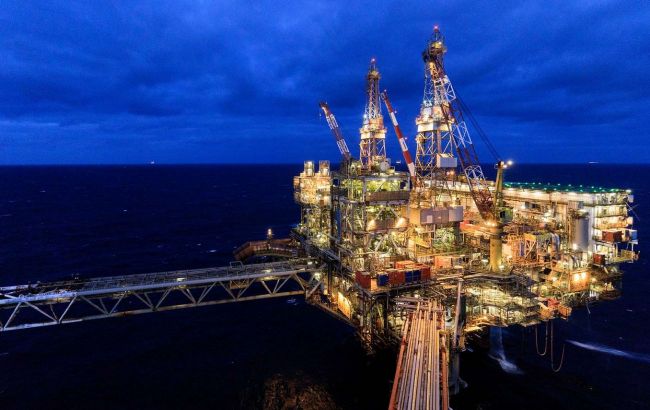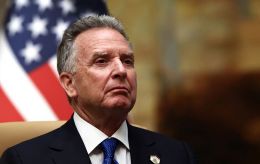Trump targets UK’s offshore wind policy, sparks rift over North Sea energy
 Photo: Britain is pushing oil and gas companies out of the North Sea with high taxes (apacorp.com)
Photo: Britain is pushing oil and gas companies out of the North Sea with high taxes (apacorp.com)
US President-elect Donald Trump continues making bold foreign policy statements, even though his inauguration is two weeks away. This time, he criticized the United Kingdom's energy policy, demanding to "open" the North Sea and get rid of the windmills.
More details and the reasons for a possible confrontation with London can be found in the RBC-Ukraine article below.
Contents
Trump vs. UK offshore energy: What happened
The North Sea is one of the world's oldest oil and gas basins, where production has been declining since the early 2000s. At the same time, it has become one of the largest regions for offshore wind energy development.
"The UK is making a very big mistake. Open up the North Sea. Get rid of Windmills!" Trump wrote on Friday on his social media account, Truth Social.
By "windmills," he refers to offshore wind farms. Offshore (from the English "offshore" – coastal) wind energy installations are built 10-12 km from the shore because winds are stronger and more consistent in open sea areas.
Trump attached a link to a November report about the plans of the US oil and gas producer APA Corp to exit the North Sea by the end of 2029. The company expects regional production to decline by 20% year-on-year.
Commenting on Trump’s remarks, a UK Labor government representative stated that they will continue to prioritize "a fair, orderly, and prosperous energy transition in the North Sea in line with our climate and legal commitments."
"We need to replace our dependency on unstable fossil fuel markets with clean, homegrown power controlled in Britain – which is the best way to protect billpayers and boost our energy independence," he added.
In response to Trump’s statement, Shadow Energy Minister for the opposition Conservative Party Claire Coutinho wrote on social media platform X that "no other major economy is shutting down its domestic oil and gas production... It’s totally mad."
Meanwhile, Western analysts are speculating about how the future president, even before officially entering the White House, is heading toward a confrontation with UK Prime Minister Keir Starmer.
What's the dispute over the North Sea
Starmer’s Labour government won the election, promising to create a low-carbon economy in the UK. Among the declared goals is to quadruple offshore wind energy capacity by the decade's end. The North Sea is central to these plans.
What makes this region noteworthy? Oil and gas exploration began here in the 1960s, with commercial production starting in 1975. In the early 2000s, production peaked at 4.4 barrels of oil equivalent.
Since then, production has declined as reserves have been depleted. According to the North Sea Transition Authority (NSTA), about 1 million barrels of oil equivalent were extracted in the North Sea last year. By 2029, production is expected to fall to around 660,000 barrels.
In October, London raised the windfall tax on North Sea oil and gas companies from 35% to 38%. As a result, the total tax rate in the sector reached 78%, one of the highest in the world. This will remain in place until March 2030, with the government intending to use the funds for "green" energy projects.
The Conservative government introduced the windfall tax in 2022 following a sharp rise in energy prices caused by Russia’s invasion of Ukraine.
Oil and gas companies Shell, Exxon Mobil, and Chevron are leaving the North Sea. Since the tax’s introduction, they have sold assets and shifted focus to other regions. Investments in oil and gas production are expected to fall by 30% by 2029 to $10.5 billion.
Off the UK coast, there are currently nearly 15 GW of offshore wind farms. By 2030, capacity is planned to increase to 60 GW. The North Sea is home to Dogger Bank, the world’s largest wind farm, with a 3.6 GW capacity built by UK company SSE and Norway’s Equinor. Once completed, it will generate enough electricity to power about 6 million homes.
What Trump’s discontent means and what it could lead to
Climate skeptic Trump has long been unhappy with wind turbines and opposes wind energy. He accuses turbines of killing whales and causing serious harm to human health — though, in his characteristic style, he has provided no credible evidence.
APA Corp's (Apache) exit from the North Sea was merely a pretext for an "attack" on Britain. However, his views clash with London’s policy, which places offshore wind energy at the center of its strategy for "green" energy and job creation. According to a report, wind farms produced 29% of the country's electricity last year. What Trump calls "windmills" are now critical for keeping the UK’s lights on.
"The US president-elect is speaking not on behalf of people in the UK, but his own ‘drill baby drill’ agenda and the Big Oil bosses who poured millions into his campaign," The Guardian quotes Doug Parr, Chief Scientist at Greenpeace UK.
According to Parr, the US president-elect’s comments reveal "total ignorance" about the situation in UK energy. He noted that jobs in the offshore sector have halved in a decade despite 400 new licenses being issued. This demonstrates that the North Sea basin is in terminal decline.
Tessa Khan, Executive Director of Uplift (a group advocating for a rapid transition from oil and gas), agrees that Trump is looking out for the interests of US oil and gas companies.
"His team is shot through with oil and gas interests that want the rest of the world, the UK included, to slow its transition to clean energy and remain hooked on oil and gas for years to come just so they can keep profiting," she said.
Even before his first presidential term, Trump clashed with Scotland’s then-First Minister Alex Salmond, calling him "mad" for allowing a wind farm to be built near his golf course in Aberdeenshire (one of Scotland’s counties). In a verbal war that escalated into a legal battle Trump lost, he claimed it would turn Scotland into a "third world wasteland that investors will avoid."
While Trump’s future energy policy may have little direct relevance to the UK, the political differences point to fundamentally different worldviews with Keir Starmer. This doesn’t mean the two leaders won’t find common ground, but the dispute over the North Sea may mark the first clash between them.
Sources: Donald Trump’s post on Truth Social, materials by Reuters, The Guardian, The Telegraph, and the BBC.

